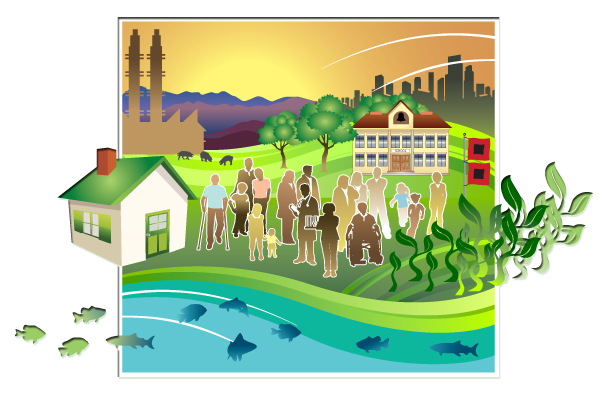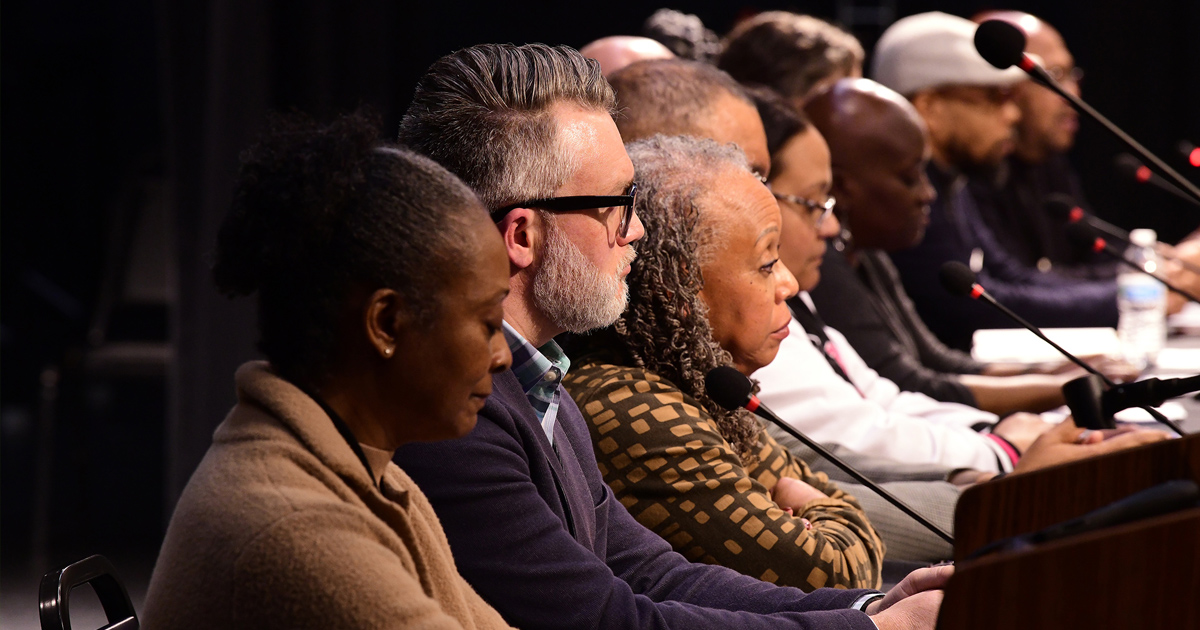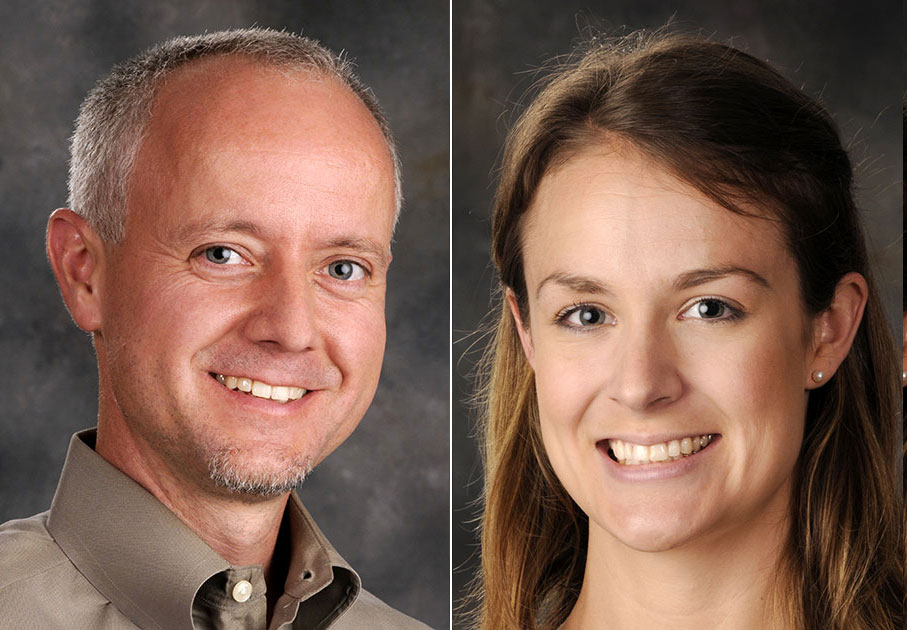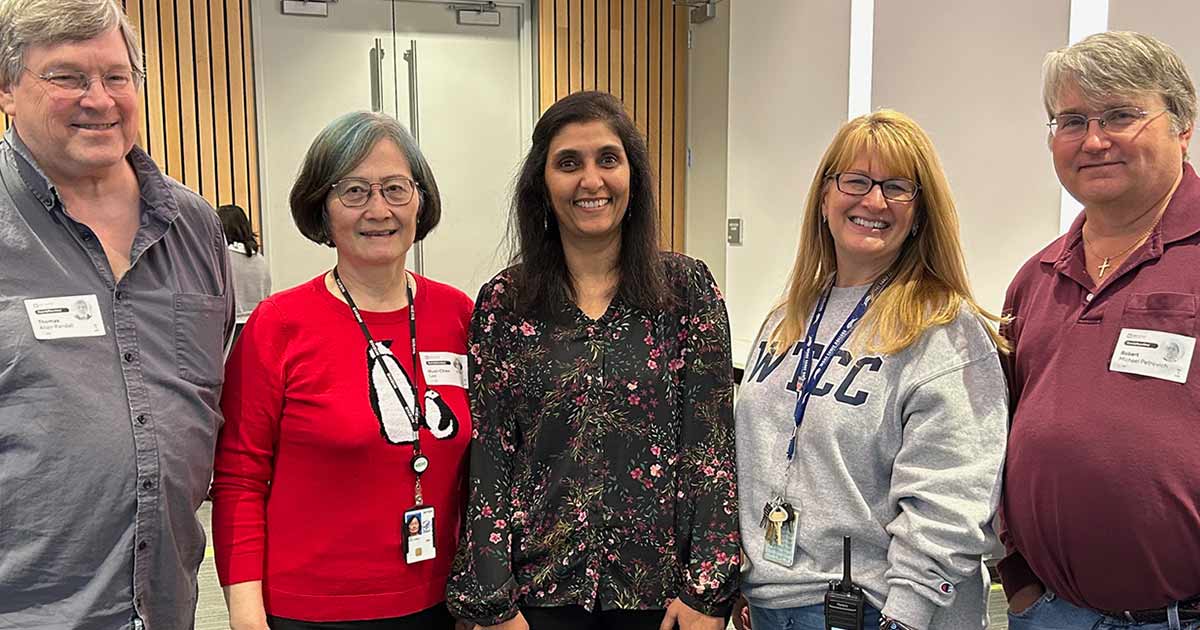Women Firefighters Help Improve Community-Based Participatory Research
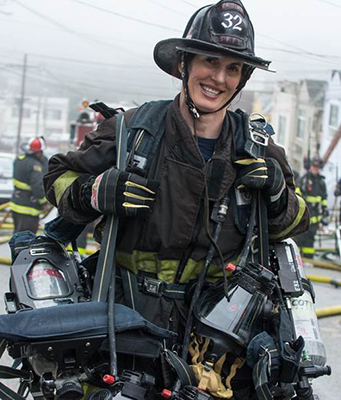
A San Francisco firefighter wearing and carrying personal protective equipment. (Photo courtesy of Rachel Morello-Frosch)
The Partners of the Women Worker Biomonitoring Collaborative (WWBC), a community-based participatory research (CBPR) collaborative, was started in 2012 to characterize environmental chemical exposures among women workers, particularly firefighters. The group recently analyzed the factors that made their partnership successful and summarized their analysis in an August 2023 paper. The paper also provides lessons for enhancing the effectiveness of CBPR on translating research into policy change to improve the health of community members.
The WWBC was initially formed by women firefighters in San Francisco in response to concerns about high numbers of breast cancer diagnoses among female colleagues. Much of the collaborative’s work has therefore influenced policies and practices that aim to reduce exposures to environmental chemicals relevant to breast cancer risk. The WWBC later expanded to include health care and office workers.
“The WWBC is the first effort to characterize women workers’ exposures to environmental chemicals linked to mammary tumors and breast cancer in toxicological and human health studies,” stated Rachel Morello-Frosch, Ph.D., MPH, professor at the University of California, Berkeley and principal investigator with the WWBC. “The impact this collaborative’s work has had on informing strategies to reduce chemical exposures, particularly among firefighters, is truly outstanding.”
Research results gathered through biomonitoring, or analysis of biological specimens collected from study participants, have been used to support policy change to reduce firefighters’ exposure to hazardous substances. Examples of policy change supported by WWBC’s work include requiring firefighting vehicles to have decontamination kits, enacting a law that provides paid leave for work-related breast cancer, restricting PFAS-containing firefighting foams in California, and banning some per- and polyfluoroalkyl substances globally, through the United Nations’ Stockholm Convention on Persistent Organic Pollutants.
The work has also supported changes in firefighters’ practices, including encouraging the use of breathing apparatuses that filter air after a fire has been extinguished, removing and decontaminating gear after returning to the station, and showering shortly after exposure to firefighting materials.
Factors That Contributed to Success
The researchers determined that several key factors enabled the WWBC to have a broad-reaching impact. The collaborative includes a community-academic partnership typical for CBPR projects: women firefighters in the San Francisco Fire Department and researchers at the University of California, Berkeley and Silent Spring Institute. The collaborative’s inclusion of labor unions and environmental advocacy organizations sets it apart and adds diversity of thought.
The firefighters who began the study initially engaged with the Breast Cancer Prevention Partners, an advocacy group that promotes restricting exposures to toxic chemicals, and Commonweal Biomonitoring Resource Center, an advocacy group that promotes producing scientific evidence of chemical exposures through biomonitoring. These partners introduced the firefighters to the academic researchers.
This collaborative supported mutually beneficial goals that led to a set of policies, novel research approaches, and greater attention to female firefighters’ health. The partners’ varying fields provided an opportunity for the WWBC’s work to support policy change at the local, state, national, and international level.
“Partnering with the advocacy groups was a critical step in advancing the firefighters’ efforts to examine and understand their exposures,” reflected Jennifer Liss Ohayon, Ph.D., a research scientist at the Silent Spring Institute. “They were also central in many of the successful efforts to translate research results into policy, which led to changes that will reduce women firefighters’ toxic exposures.”
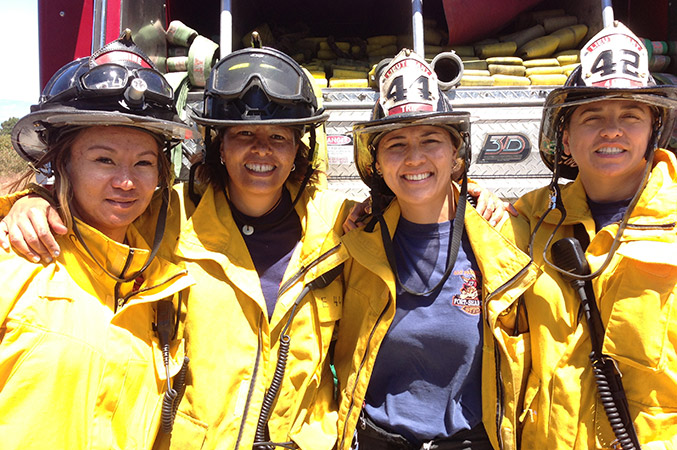
Firefighter participants in the WWBC. (Photo courtesy of Rachel Morello-Frosch)
Another strength of the WWBC was its early focus on implementing strategies to prevent adverse health outcomes. For example, researchers knew from previous studies that firefighters were exposed to elevated levels of certain toxic chemicals. Therefore, even before biomonitoring analyses were finished, WWBC partners developed a training program, “Extinguishing Breast Cancer in the Fire Service,” that promoted practices to reduce harmful exposures. By showing that the firefighters’ health, not just the research results, was a priority, the researchers say they gained the firefighters’ trust.
Clear communication was also key to the WWBC’s success. Researchers prioritized explaining scientific concepts in plain language and ensuring that study goals were realistic and understood by all partners. For example, while firefighters hoped to learn whether certain exposures were causing breast cancer, researchers clarified that the research could not show causation but could help participants get a better understanding of which chemical exposures may be relevant to breast cancer risk. Partners in the WWBC also created a digital report-back tool that explained individual biomonitoring results to each study participant ethically and effectively.
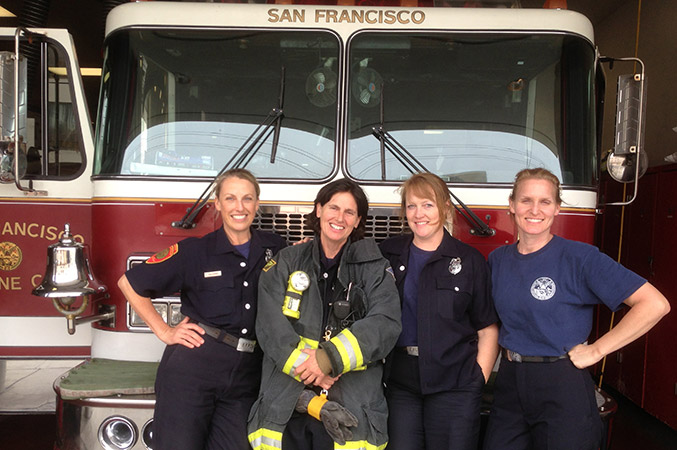
Firefighter participants in the WWBC. (Photo courtesy of Rachel Morello-Frosch)
An emphasis on collaborative partnerships and co-learning further enabled the WWBC’s success. Firefighters provided important insights into their profession for developing study design protocols, contributing to peer-reviewed articles, recruiting study participants, presenting at conferences, and developing an exposure assessment survey, among other activities.
Lessons Learned and Next Steps
Other CBPR researchers can apply facets of the WWBC’s work to their studies. A critical factor in the WWBC’S success was creating a collaborative and diverse partnership that could reach various levels of policymaking, from local to international. Other researchers could consider engaging with relevant advocacy groups, and if the study involves workers, engaging with workers’ unions or advocacy organizations.
Moving forward, the WWBC’s goal is to further expand. They want to create a women workers’ biospecimen bank that includes a broader array of health care workers, such as patient care aides and environmental service workers, and domestic workers, such as house cleaners and home health care aides. The data, including the biospecimens, will be available for researchers who seek to better understand how occupational exposures affect breast cancer and other health outcomes.
Environmental Scholars Program Brings Environmental Health Education to Doctors and Nurses
The NIEHS-funded Environmental Research and Translation for Health Center at the University of California, San Francisco, together with community partners, started a program, the Environmental Scholars Program, to bring environmental health education to health care professionals. The program prepares doctors and nurses to identify and address health issues caused by environmental exposures and a changing climate. Program participants do coursework, receive guidance from mentors, and conduct community engagement work through a summer internship with underserved communities facing environmental exposures. Anna Claire Fernández, a medical student participating in the program, thinks combining public health and medicine is important because doctors are involved in treating health issues that arise from the climate crisis, and she appreciates the opportunity to think about how health is affected by the environment. In order to have a broader impact among medical students, program staff are developing an elective course for the university’s medical school. Staff also hope to expand the program model to other environmental health sciences core centers.
Youth Help Create COVID-19 Messaging
Youth were among the most affected by the pandemic’s disruptions to daily life, but their perspective was often left out of pandemic response efforts. To fill this gap, a team from the Arizona-based NIH Community Engagement Alliance involved youth in creating health messages for their communities. First, the team collaborated with schools, sports networks, and other organizations to create a diverse youth community advisory board, composed of people aged 16 to 25. The board then held a crowdsourcing contest, inviting people in Arizona, aged 14 to 25, to submit artwork, poems, or essays that either included messaging on COVID-19 vaccination and masking or raised awareness of challenges faced by youth during the pandemic. Contest submissions will be shown in public galleries across Arizona, and local reporting covered the contest. The NIH-funded team is also studying how contest submissions influenced public behavior related to the pandemic. Read more about this effort on the NIH Community Engagement Alliance webpage.
Call for Papers on Extreme Heat in Cities
The U.S. Department of Housing and Urban Development is calling for papers on how to cool cities or mitigate the impacts of extreme heat, especially for socially vulnerable groups and people of low and moderate income. The papers will be published in 2025 in Cityscape, a publication that highlights original research on housing and community development issues. Potential topics for papers are the effectiveness of interventions, such as green infrastructure, at cooling down urban areas; case studies of city planning designed to decrease or mitigate the urban heat island effect; and how urban communities can build resilience through social and organizational means. The submission deadline is April 3, 2024.
NIEHS-Funded Team Provides Training on Using Low-Cost Air Sensors, Will Present at February PEPH Meeting
An NIEHS-funded team of researchers is working with community-academic teams to provide training on community-engaged research, research methods for using low-cost air quality sensors, and how to translate data into action. The training program, Research Innovations using Sensor Technology in Environmental Justice Communities (RISE Communities), was motivated by the challenges associated with using low-cost sensors, such as maintenance, calibration, and data visualization. The first of five sets of community-academic teams completed in-person training in August 2023 and will continue to participate in the program through webinars, check-ins, and discussion boards. After the in-person training, each team received 12 sensors with which to start research projects in their communities. Patrick Ryan, Ph.D., an environmental health researcher with the Cincinnati Children’s Hospital Medical Center, will present a poster on the project at the February PEPH meeting. The poster is titled Engaging and Developing Community-Academic Partnerships Using Low-Cost Sensors in Environmental Justice Communities: The RISE Communities R25 Program.
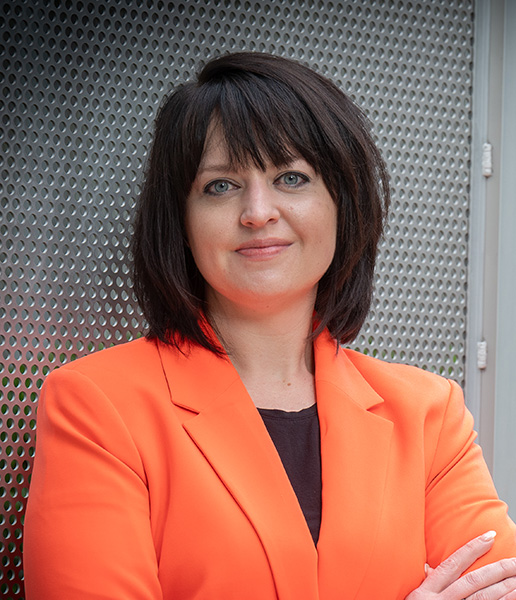
PEPH Grantee Highlight
Ashlee Fitch
Ashlee Fitch has her grandfather to thank for teaching her the importance of being equitable and fair to everyone, an ethic reflected in her advocacy for workers’ rights and safety. Fitch is the director of the United Steelworkers Tony Mazzocchi Center, the primary training division for the Steelworkers Charitable and Educational Organization. The center, which receives funding from the NIEHS Worker Training Program, is a network of nonprofit organizations that deliver health and safety training to people in industries such as pharmaceuticals and manufacturing. One of the most effective tools to prevent fatal on-the-job incidents is high-quality training and the center provides workers the resources they need to do their jobs safely, according to Fitch.
Funding Opportunities
Undergraduate Research Education Program (UP) to Enhance Diversity in the Environmental Health Sciences (R25 Clinical Trial Not Allowed)
Supports educational activities that encourage individuals from diverse backgrounds, including those from groups underrepresented in the biomedical and behavioral sciences, to pursue further studies or careers in research. NIEHS UP (R25) programs supported by this NOFO are expected to consist of both an introduction to environmental health sciences research through experience on a research project with the participating faculty and an organized educational program (seminars, etc.) designed to acquaint participants with the larger field of environmental health sciences. The focus of both the research experience and the educational experiences should be within the mission interests of NIEHS, which explores how the environment affects people’s health. Programs which propose only the research experience within the context of a university-wide program for undergraduate students will not be considered responsive to this announcement.
Deadline: February 14, 2024
Notice of Special Interest: Administrative Supplements to Recognize Excellence in Diversity, Equity, Inclusion, and Accessibility Mentorship
Supports administrative supplements to existing NIH awards to support scientists who have demonstrated compelling commitments and contributions to mentorship and enhancing diversity, equity, inclusion, and accessibility (DEIA) in the biomedical sciences. This Notice of Special Interest (NOSI) encourages program directors and principal investigators to promote DEIA and mentorship broadly and as such differs from a Diversity Supplement (PA-23-189). Diversity supplements are designed to support research experiences for individuals from diverse backgrounds, including those from underrepresented groups, through the career continuum from high school to the faculty level. In contrast, this NOSI focuses on mentors who have dedicated their time and effort and have made significant contributions, based on evaluation data and publications, to DEIA. Mentors are encouraged to apply for an administrative supplement to further their personal research and/or mentoring activities.
Deadline: February 16, 2024
PHS 2023-2 Omnibus Solicitation of the NIH and CDC for Small Business Innovation Research Grant Applications (Parent SBIR [R43/R44] Clinical Trial Required)
Invites eligible United States small business concerns to submit Small Business Innovation Research (SBIR) Phase I, Phase II, Direct to Phase II (NIH only), Fast-Track (NIH only), and Phase IIB (NIH only) grant applications. The PHS 2023 -2 SBIR/STTR Program Descriptions and Research Topics for NIH, CDC, and FDA represent scientific program areas that may be of interest to applicant small businesses in the development of projects that have potential for commercialization. Small business concerns that have the research capabilities and technological expertise to contribute to the research and development mission(s) of the NIH and CDC awarding components identified in this funding opportunity are encouraged to submit SBIR grant applications in these areas. A related SBIR funding opportunity is available without a clinical trial requirement: PHS 2023-2 Omnibus Solicitation of the NIH, CDC and FDA for Small Business Innovation Research Grant Applications (Parent SBIR [R43/R44] Clinical Trial Not Allowed). Related funding opportunities are available for small business applicants interested in submitting small business technology transfer (STTR) applications: PHS 2023-2 Omnibus Solicitation of the NIH for Small Business Technology Transfer Grant Applications (Parent STTR [R41/R42] Clinical Trial Not Allowed) and PHS 2023-2 Omnibus Solicitation of the NIH for Small Business Technology Transfer Grant Applications (Parent STTR [R41/R42] Clinical Trial Required).
Deadline: April 5, 2024
SBIR/STTR Commercialization Readiness Pilot (CRP) Program Technical Assistance and Late Stage Development (SB1, Clinical Trial Not Allowed)
Encourages applications from small business concerns to the newly re-authorized Commercialization Readiness Pilot (CRP) program. The funding opportunity aims to facilitate the transition of previously or currently funded Small Business Innovation Research (SBIR) and Small Business Technology Transfer (STTR) Phase II and Phase IIB projects to the commercialization stage by providing additional support for technical assistance and later stage research and development not typically supported through Phase II or Phase IIB grants or contracts. This may include independent replication of key studies, Investigational New Drug-enabling studies, clinical studies, manufacturing costs, regulatory assistance, or a combination of services. Although a significant amount of the work in a CRP award may be subcontracted to other institutions, the small business concern is expected to maintain oversight and management of research and development throughout the award.
Deadline: April 5, 2024
Ruth L. Kirschstein National Research Service Award (NRSA) Individual Predoctoral Fellowship (Parent F31)
The Ruth L. Kirschstein NRSA Individual Predoctoral Fellowship (Parent F31) award enables promising predoctoral students to obtain individualized, mentored research training from outstanding faculty sponsors while conducting dissertation research in scientific health-related fields relevant to the missions of participating NIH Institutes and Centers. The proposed mentored research training must reflect the candidate’s dissertation research project and is expected to clearly enhance the individual’s potential to develop into a productive, independent research scientist. Funding opportunities are also open for the Ruth L. Kirschstein NRSA Individual Fellowship for Students at Institutions with NIH-Funded Institutional Predoctoral Dual-Degree Training Programs (Parent F30), which supports promising predoctoral students who are matriculated in a combined M.D./Ph.D. or other dual-doctoral degree training program, and who intend careers as physician/clinician-scientists; the Ruth L. Kirschstein NRSA Individual Senior Fellowship (Parent F33), which supports experienced scientists who wish to make major changes in the direction of their research careers or who wish to broaden their scientific background; the Ruth L. Kirschstein National Research Service Award (NRSA) Individual Fellowship for Students at Institutions Without NIH-Funded Institutional Predoctoral Dual-Degree Training Programs (Parent F30) to enhance the integrated research and clinical training of promising predoctoral students, who are matriculated in a combined M.D./Ph.D. or other dual-doctoral degree training program, and who intend careers as physician/clinician-scientists; the Ruth L. Kirschstein National Research Service Award (NRSA) Individual Postdoctoral Fellowship (Parent F32) to support research training of highly promising postdoctoral candidates who have the potential to become productive, independent investigators; and the Ruth L. Kirschstein National Research Service Award (NRSA) Individual Predoctoral Fellowship to Promote Diversity in Health-Related Research (F31-Diversity) to enhance the diversity of the health-related research workforce by supporting the research training of predoctoral students from diverse backgrounds.
Deadline: April 8, 2024
Notice of Special Interest (NOSI): Data Informed, Place-Based Community-Engaged Research to Advance Health Equity
This NOSI is meant to stimulate community-engaged research that leverages geospatial data to probe the influence of geographic factors on disease development and health outcomes. Its goal is to use place-based research to help advance health equity in different communities. Applicants must select the IC and associated NOFO to use for submission of an application in response to the NOSI. NIEHS is interested in applications that integrate place-based environmental data with other data types and sources (such as human behavior and time-activity patterns, environmental data collected by low-cost sensor networks or wearable technologies, biomonitoring data, and other molecular or clinical outcome data) to improve exposure estimates at both the community and individual level, to advance understanding of the effects of environmental exposures on health outcomes, and to inform prevention and intervention strategies. Applicants may apply through PA-20-185 or PA-20-195.
Deadlines: June 5, 2024; October 5, 2024
Intervention Research to Improve Native American Health (R01 Clinical Trial Optional)
Supports research on interventions to improve health in Native American populations, including:
- Etiologic research that will directly inform intervention development or adaptations.
- Research that develops, adapts, or tests interventions for health promotion, prevention, treatment, or recovery.
- Where a sufficient body of knowledge on intervention efficacy exists, research on dissemination and implementation that develops and tests strategies to overcome barriers to the adoption, integration, scale-up, and sustainability of effective interventions.
The inclusion of Native American investigators serving on the study team or as the program director or principal investigator is strongly encouraged. This funding opportunity is part of the Intervention Research to Improve Native American Health initiative, which also includes Intervention Research to Improve Native American Health (R21 Clinical Trials Optional), and Intervention Research to Improve Native American Health (R34 Clinical Trial Optional). For the R01 and R21 funding mechanisms, NIEHS is interested in applications that focus on the development, adaptation, efficacy, effectiveness, implementation, or sustainability of culturally appropriate interventions to prevent or mitigate the health impacts of environmental exposures that disproportionately impact Native American populations. For the R34 funding mechanism, NIEHS is interested in applications that support the initial development of a culturally appropriate clinical trial or research project in preparation for health promotion or disease prevention interventions addressing the health impacts of environmental exposures that impact Native American populations.
Deadline: October 1, 2024
Environmental and Climate Justice Community Change Grants Program
The Environmental Protection Agency (EPA) is accepting applications for its Environmental and Climate Justice Community Change Grants program. The program provides Inflation Reduction Act funds in environmental and climate justice activities to benefit disadvantaged communities through projects that reduce pollution, increase community climate resilience, and build community capacity to address environmental and climate justice challenges. These place-based investments will be focused on community-driven initiatives to be responsive to community and stakeholder input. The entities eligible to apply under this opportunity are:
- A partnership between two community-based nonprofit organizations.
- A partnership between a community-based nonprofit organization and one of the following:
- A federally recognized tribe.
- A local government.
- An institution of higher education.
Other organizations and entities may be able to participate and be involved in the Community Change Grants projects as collaborating subrecipients and/or procurement contractors selected in compliance with competition requirements. The EPA is accepting applications on a rolling basis; therefore, interested applicants are encouraged to apply early. To apply for this opportunity, see the announcement on Grants.gov.
Deadline: November 21, 2024
Upcoming PEPH-related Events
International Society of Exposure Science: Public Sector Panel Discussion. The mentorship committee of the International Society of Exposure Science will host this panel discussion focused on public sector careers within the field of exposure science. The discussion will be geared toward people who are interested in careers in exposure science, either as a career change or a new career as they prepare to graduate. Society members and non-members are welcome to attend. Registration is available.
PEPH Meeting: Climate Change and Environmental Justice – Engaging Diverse Teams (Durham, North Carolina). PEPH grantees and partners are invited to attend this meeting to discuss common issues, approaches, and opportunities in climate change and environmental justice. There will be poster sessions and workshops in which participants will share skills, trainings, and approaches. Learn more on the meeting webpage.
Society of Toxicology Annual Meeting (Salt Lake City, Utah). This conference will have oral scientific sessions, poster presentations, social events, and the ToxExpo, which features organizations such as research organizations, government agencies, consulting firms, and academic institutions that support the toxicology community. Speakers will present on a range of environmental public health topics such as the health impacts of wildfire smoke, how wildfires affect susceptibility to respiratory disease, using geographical information to promote environmental justice, and findings on harmful algal blooms from the Oceans and Human Health Program, a joint effort of NIEHS and the National Science Foundation. Registration is available.
National Environmental Health Association: Impact of Climate Change on Alaskan Natives (webinar). Speakers will talk about the environmental health impacts of climate change on Alaska Natives, such as food sovereignty, and how local organizations address these effects. Registration is available.
National Environmental Health Association’s Annual Educational Conference and Exhibition (Pittsburgh, Pennsylvania and virtual). The conference will have more than 250 educational sessions on topics such as air quality and climate change. Registration (including single-day options) is available.




